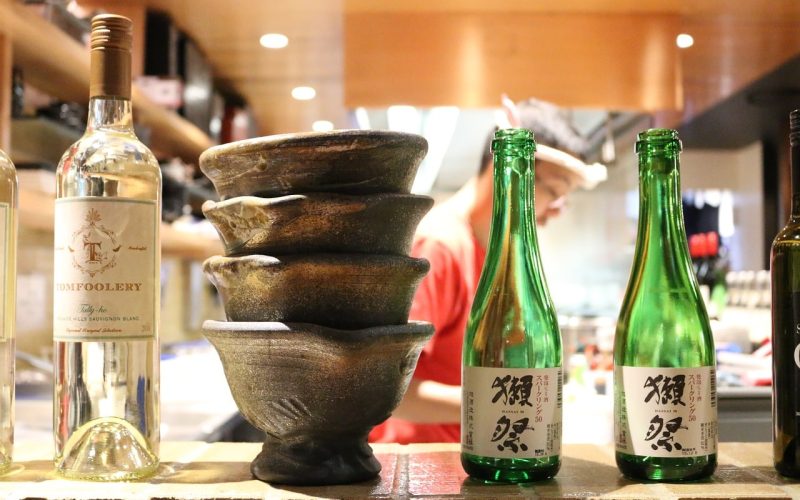There’s nothing like cooking with wine to add flavor and depth to your dishes, but many of us don’t keep cooking wine on hand just in case inspiration strikes!
However, cooking wine can be expensive, so it’s not always practical to have it around.
Luckily, you can use any substitute for cooking wine in your recipes to save money and still deliver the same great taste.
Here are substitutes for cooking wine that works just as well as regular cooking wine in most recipes.
1. Rice Wine
A popular choice for stir-fries, rice wine is made from fermented rice and comes in two types: white and red.
It has a slightly sweet flavor and is usually used as a deglazing agent or to add depth to sauces. You can find it in most Asian markets.
If you don’t have access to an Asian market, try substituting with sake (Japanese rice wine) or dry sherry.
The former will give your dish a more vinegary kick, while the latter will be more mellow.
2. White Wine
If you don’t have any cooking wine on hand, don’t worry! You can use white wine as one of the best substitutes for cooking wine.
Remember that the alcohol won’t cook out, so use a dry white wine like Sauvignon Blanc or Chardonnay.
You can also use vermouth, a type of fortified white wine. Just reduce the amount of liquid in your recipe by about half.
3. Red Wine
You can use red wine as the best substitute for cooking wine for white wine.
Keep in mind that it will change the flavor of your dish. If you don’t want your food to taste too fruity, try using a dry red wine.
Merlot and Cabernet Sauvignon are good options. Just make sure to adjust the amount of red wine you use since it is more potent than white wine.
For every cup of wine needed, you’ll need to add 1/4 cup of water or broth. The same goes for chicken broth if you plan on substituting it instead.
4. Apple Cider Vinegar
When substituting apple cider vinegar for white wine, use a 1:1 ratio. For example, if the recipe calls for 1 cup of white wine, use 1 cup of apple cider vinegar. If substituting apple cider vinegar for red wine, use a 2:1 ratio.
For example, if the recipe calls for 1 cup of red wine, use 2/3 cup apple cider vinegar.
Be sure to cook the mixture until it has been reduced by half before adding it to your dish.
5. Balsamic Vinegar
Balsamic vinegar is a dark, concentrated vinegar made from grape juice and aged in wooden casks. Its complex, sweet-tart flavor can add depth to many dishes.
While it’s not technically a wine, balsamic vinegar can substitute for cooking wine in many recipes.
Here are some tips for using it:
- When substituting balsamic vinegar for wine, use one tablespoon for every 1/4 cup of wine called for in the recipe.
- Balsamic vinegar can be used to deglaze a pan. To do this, add vinegar to the pan after cooking your protein or vegetables. Then, scrape up any brown bits stuck to the pan’s bottom.
6. Soy Sauce
Soy sauce is a great substitute for cooking wine because it has a similar salty flavor. Plus, it’s easy to find and usually already in your pantry.
Substitute soy sauce for cooking wine in your recipe with an equal amount.
Since soy sauce is darker than most cooking wines, it may change the color of your dish slightly.
7. Pomegranate Juice
Pomegranate juice is an excellent substitute for red wine when cooking.
Its similar sweetness and acidity make it ideal for deglazing a pan or making a reduction sauce.
Plus, it’s non-alcoholic, so you don’t have to worry about the alcohol content affecting your dish.
To substitute, use an equal amount of pomegranate juice, like red wine.
8. Ginger Ale
When a recipe calls for wine, it can be tempting to grab whatever bottle is collecting dust in your fridge.
But if you don’t keep wine on hand, don’t fret. There are substitutes for cooking wine that will work in a pinch.
One great substitute is ginger ale. It will add a touch of sweetness and fizz to your dish.
Just be careful not to use too much, or the ginger flavor will overwhelm your meal.
9. Chicken, Beef Vegetable Stock, or Broth
You might not have cooking wine on hand when you need it for many reasons.
Maybe you forgot to pick some up at the store, or you don’t keep alcohol in the house for personal reasons.
Whatever the case, there’s no need to worry! Plenty of substitutes will work just as well in your recipe.
Substitutes like chicken, beef, vegetable stock, and broth can be used instead of cooking wine without significantly altering the recipe.
They’ll provide more flavor than water but less salt than adding table salt would.
If you’re going for a more neutral flavor profile, you can also use apple cider vinegar (1 tablespoon per cup) or rice vinegar (2 tablespoons per cup) instead of cooking wine.
This substitution will provide little to additional flavor but add acidity to balance out any other flavors in your dish.
If you want something with an acidic kick, try lemon or lime juice instead!
10. Lemon Juice
If you don’t have any cooking wine on hand or are looking for healthier substitutes for cooking wine, try lemon juice! It’s tart and acidic, so it can brighten up a dish.
Plus, it’s a great way to add extra vitamin C to your meal. Here are a few tips for using lemon juice as a substitute for cooking wine:
- When using lemon juice to deglaze a pan, add it towards the end of cooking so it doesn’t evaporate.
- Add lemon juice sparingly since it is much more acidic than cooking wine. You can always add more if needed. – Add acidity slowly to avoid ruining your sauce.
- Dilute with water before adding lemon juice to dishes like scrambled eggs or oatmeal; otherwise, it will taste too sour.
11. Liquid From Canned Mushrooms
If you don’t have any wine on hand and a recipe calls for it, don’t worry! There are plenty of substitutes for cooking wine you can use in a pinch.
One option is to use the liquid from canned mushrooms. Open a can of mushrooms (draining them first) and use the liquid instead of wine. This works incredibly well in dishes that also include mushrooms.
12. Tea Leaves
Instead of using wine to deglaze your pan after browning meat or vegetables, consider using tea leaves.
We’ve found that black tea leaves work well for this purpose! Add two tablespoons to two cups of boiling water to help loosen bits stuck to the bottom of your pan before pouring everything into your dish.
13. Tomato Juice
Tomato juice is a versatile ingredient used as a major substitute for cooking wine.
Its acidity is similar to that of wine, which can help tenderize meat and add flavor to dishes. Plus, it’s a great way to add extra nutrition to your meal.
Here are some tips for using tomato juice as a substitute for cooking wine:
- To tenderize meat, marinate it in tomato juice for at least 30 minutes before cooking.
- Add tomato juice to soups and stews for an extra flavor boost.
- Use it as a deglazing agent when making pan sauces. Add some tomato juice to the pan after cooking the meat or vegetables, and scrape up any brown bits from the bottom of the pan.





